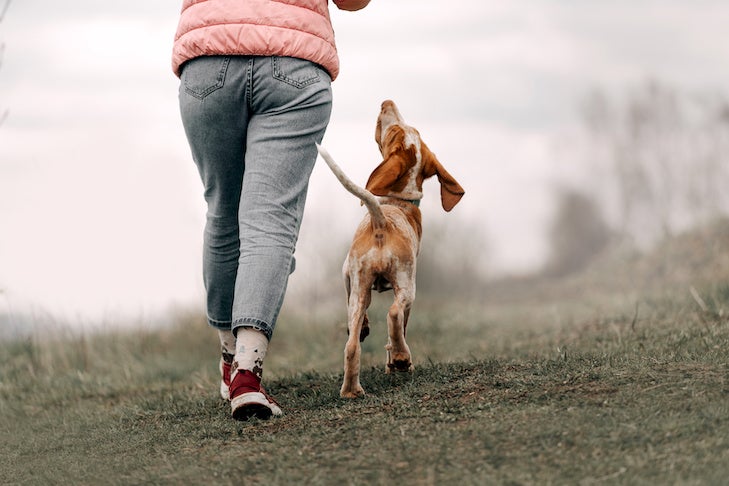- Responsible AKC Marketplace dog breeders will offer lifelong support in caring for your dog.
- Certified Applied Animal Behaviorist & Director of AKC Family Dog Programs Dr. Mary Burch offers tips to make puppy training less overwhelming.
- Consistent, short training sessions are key to a well-behaved puppy: GoodDog! Helpline can suggest a routine virtually.
When the going gets tough, the tough get dogs. That was the lesson of 2020, when global lockdowns saw dog breeders’ waitlists multiply and rescues empty as everyone rushed out for a furry companion. But new findings reveal a stunning 73 percent of people who became first-time dog owners during the COVID-19 crisis have considered rehoming their pup once the pandemic ends.
Owners cite their surprise at the time and money it takes to care for a dog, as well as insufficient access to information about dog care. We spoke to a panel of experts for their tips on making dog ownership more manageable and rewarding, to help dogs around the country stay happily settled in their homes.
If you’re struggling to care for your dog: reach out for help
First and foremost, know that there is an awful lot of support available for dog owners.
If it’s money or vet bills you’re worried about, check out our guide to accessing free and low-cost veterinary care.
How about if you’re simply struggling with your dog’s needs, or you need more information?
If you bought your puppy from a reputable, registered breeder, that breeder will offer lifelong support in caring for your dog. “We raise the puppies from birth, so we get attached to them too. We want them to succeed,” Dogo Argentino breeder Lindsey Peterson told me. “I prepare a puppy pack for my puppies and send them home with everything they need… And I always let [the owner] know that I’m here, don’t hesitate to ask me any questions you have.”
Registered breeders are also founts of information about the specific needs of their breed, so if you’re struggling with an information gap about your dog’s health, grooming needs, behavior, nutritional needs, or anything else, your breeder is a great place to turn.

If your own breeder isn’t available but you do have a purebred dog, Lindsey encourages you to reach out to another breeder working with the same breed. “I’m often getting emails and messages from other Dogo Argentino owners with puppies that I haven’t bred,” she told me, “and I’m glad to help them. I think I speak for all responsible breeders that we just want to see our breed succeed.”
But if your dog didn’t come from a registered breeder, fret not. Juliet Boyd, Executive Director of Oakland’s Hopalong Animal Rescue, encourages anyone struggling with dog ownership to reach out to their own or another local rescue organization. “A lot of these organizations can provide support through Zoom, online, etcetera, for exactly this issue,” Boyd continued. “They were one step ahead anticipating this, and are now more geared to supporting pets staying in the home at the end of COVID.”
And if it’s virtual support you need, there’s also AKC’s Good Dog! Helpline, a live telephone service offering individualized training advice for all owners and their dogs.
Getting the most from the dog-human relationship
The best way to make dog ownership more rewarding is to strengthen the bond between you and your pup. After all, if you’re not well bonded, caring for them might seem like a chore, rather than a pleasure.
This means that, in addition to simply feeding your dog and taking care of their basic needs, it’s important to invest in the relationship. According to Certified Applied Animal Behaviorist Dr. Mary Burch, the key questions are: “Does the owner enjoy the dog and does the dog enjoy the owner?”
Playing with your dog, petting and grooming them, starting an AKC sport, and finding training and exercise routines that are rewarding for both the dog and the owner are crucial parts of strengthening the bond between you and making the time you spend with your pup feel worthwhile.
If all this sounds time-consuming, know that it doesn’t have to—and ideally, shouldn’t—all fall to one member of the household. If there’s more than one person living in your home, make sure it’s not just one person caring for the dog. More people tending to the dog’s needs is good for everyone: it means less overwhelm for parents or other responsible figures and more people benefiting from a close relationship with the dog. And for the pup, the more love they receive, the better.

The time crunch: making dog ownership more manageable
Busy people, take note: bonding and exercise don’t have to mean spending hours walking in the forest together every single day. There are plenty of ways to keep your dog happy, entertained, and adequately exercised, while still leaving you time for your other duties.
If time is of the essence, Dr. Mary Burch suggests saving the longer hikes and adventures away from home for the weekend, and sticking to neighborhood walks and vigorous games of fetch in the yard or local park during the week. “Dogs that have been taught to fetch can chase a ball or disc and get good exercise at home in a short period of time,” she notes, adding that some games can even be played inside the home, for those without yards: for instance, trick training and fetch in a long hallway.
And if you have some money to spare, there are additional options. Consider having a dog walker come by every day, for instance, or putting your dog in doggy daycare. Lindsey Peterson also recommends flirt poles and dog treadmills as ways to keep dogs active without requiring a large expedition away from the home—though she adds that it’s important to be careful with puppies around dog treadmills, since they shouldn’t be over-exercised.
Dealing with an “unruly” dog
For some owners, the problem might be that the dog is tearing up the household and disturbing an already precarious balance. “If dogs are unruly around the house,” says Dr. Mary Burch, “the first step is to make sure you are meeting the dog’s needs. High-energy dogs who don’t get enough exercise are likely to be overly active, and this can sometimes be misinterpreted as ‘unruly.'” Lindsey Peterson adds that mental exercise is also important for dogs, so dog puzzles can be helpful—and can be completed by the dog without supervision.
Dr. Burch also recommends taking a close look at exactly when your dog tends to misbehave. If it’s precipitated by, for instance, children being boisterous or long periods of inactivity, modifying the human behavior in the household might take care of the dog’s behavioral problems.
Of course, it’s also vital to ensure that your dog has been sufficiently trained. This not only helps ensure that the dog will be well behaved in the first place, but also improves communication between dogs and their humans, making for a smoother relationship all-round. For in-person classes (subject to local COVID-19 restrictions), check out AKC’s Canine Good Citizen program.
And if in-person classes aren’t an option where you are, there are now plenty of online options instead. There’s a title for home-trained pups to work toward: AKC’s Virtual Home Manners program, which tests ten home manners skills via video recording.

If you decide to rehome your dog
If it really is impossible for you to give your dog the quality of life he or she deserves, sadly, it might be necessary to rehome them. This should always be the last step and should be made in consultation with your breeder. What’s the best way to do that? Where will they be most likely to thrive?
- First, if your dog came from a breeder, check in with the breeder. Most responsible dog breeders will take the dog back from you or will want a say in how the dog is rehomed.
- If the dog is a purebred but returning them to the breeder isn’t an option, check with the AKC Rescue Network. Many AKC breed clubs rescue dogs of their breeds and have contacts you can reach out to for advice.
- Do you have a friend or relative who would give your dog a loving, healthy home? Placing the dog yourself, in a trusted home, can help minimize the dog’s suffering.
- Reach out to a local shelter, but be aware that different shelters provide different levels of service when it comes to placing dogs. If you already know for certain that you’re going to give up your dog, and if a shelter is the best route for your situation, Juliet Boyd recommends trying to rehome them sooner rather than later, since many shelters are still relatively empty now, and will likely start to fill up again as more people are vaccinated and return to the workplace.
Finally, Juliet Boyd encourages all dog owners and prospective dog owners to remember that a pup is not a disposable item but a member of the family. “It’s not easy on them to just move from Point A to Point B,” she says. “Even if they were to go from one nice home to another nice home, it’s not easy on them. They bond strongly to their people and are very aware of their surroundings.”
Thankfully, there are plenty of resources designed to help keep as many dogs with their families as possible. Always do your research before adding a dog to your home and remember that a dog is a lifetime commitment.
The AKC is here to help owners with questions and concerns about COVID-19 and dogs. Find answers to your questions, plus at-home activity ideas, training tips, educational resources, and more on our Coping With COVID-19 hub.

